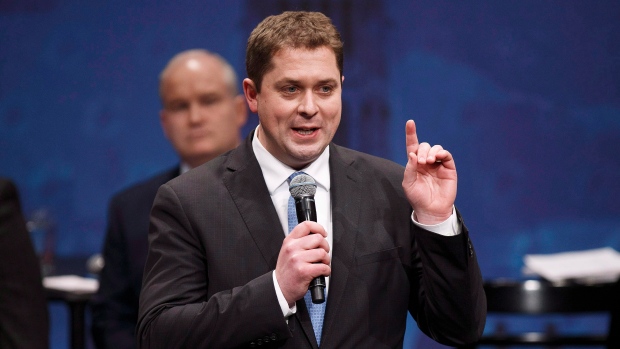May 29, 2017
Andrew Scheer is about to find out why balanced budgets are an 'endangered species'
By Greg Bonnell

Freshly minted Conservative Party Leader Andrew Scheer says he’d scrub the red ink from Ottawa’s books as prime minister -- a tall order in a country where balanced budgets are seen as an “endangered species.”
The revenue-strapped Liberal government plans to run a $28.5-billion deficit for the coming fiscal year, with no balance in sight over the next five years.
Finance Minister Bill Morneau’s own department has sketched out a fiscal scenario in which deficit spending could be the norm until 2050.
In short – the fiscal hole Scheer intends to fill within two years of a Conservative election victory in 2019 is a deep one.
On the surface, the solution is simple; increase revenue or cut spending. But politics is anything but simple.
“I think if a balanced budget was an animal, it would be at the top of the endangered species list right now,” Tim Regan, Managing Director at Kingwest & Company, told BNN in an interview Monday.
“They can’t tax anymore, so they’re going to have to cut to balance the budget. That’s going to be a big, big issue.”
Indeed, if Scheer campaigned for the 2019 election on a platform of tax increases and/or new levies it would a strange sight for Conservatives. And party faithful will be quick to point out the Harper Conservatives balanced the budget before the 2015 vote that propelled the Trudeau Liberals to power.
- 5 things you need to know about Scheer’s economic policies
- Andrew Scheer steps onto Parliament Hill for first time since winning Conservative race
- Meet Andrew Scheer, the Conservative party's new leader
SCHEER AND NOW
It’s the Liberals’ ambitious infrastructure plan that pushed Ottawa into large deficits. The Trudeau government is on track to push $186 billion out the door for infrastructure over the next decade.
The aim is to stoke economic growth. But earlier this year, a Senate committee warned that billions of the infrastructure spending could be wasted without a clear strategy on how it should be deployed.
The key, the Senate committee said in its report, is to make sure the money goes to the right infrastructure projects -- ones that produce an economic return.
While the spectre of billions in potentially wasted infrastructure spending feels like a starting point for belt-tightening, Scheer’s plan to balance is still more than four years out – by which point those infrastructure dollars will already be flowing and large amounts already spent, Craig Alexander, chief economist of The Conference Board of Canada, told BNN in an interview.
With the finance department forecasting “deficits for the rest of time,” it appears Ottawa’s deficits are structural – meaning economic growth won’t make them go way, said Alexander.
Slashing program spending is the more likely route to balance, and Scheer will be faced with some “tough choices” with “no middle ground,” he added.
And while politics is all about promises, at least one political observer doesn’t think Scheer will deliver on his vow to balance.
“It’s the type of promise you have to make to keep small c-conservatives happy,” Nelson Wiseman, director of the Canadian studies program at University of Toronto, told BNN in an interview.
“No one realistically believes the Canadian budget is going to be balanced in two years.”